Lisa A. Carey, MD, on SABCS Meeting Highlights: Expert Perspective
2016 San Antonio Breast Cancer Symposium
Lisa A. Carey, MD, of the University of North Carolina, discusses a session she moderated on key data presented at SABCS, and gives her expert views on putting the research data into clinical practice.
Ruth O’Regan, MD, of the University of Wisconsin, and Ann H. Partridge, MD, of the Dana-Farber Cancer Institute, discuss study findings on the prognostic associations of TILs in metastatic HER2-positive breast cancer (Abstract S1-04).
Ruth O'Regan, MD, of the University of Wisconsin, discusses study findings on buparlisib plus fulvestrant in postmenopausal women with HR-positive, HER2-positive, aromatase inhibitor–treated, locally advanced or metastatic breast cancer, who progressed on or after mTOR inhibitor–based treatment (Abstract S4-07).
Sara A. Hurvitz, MD, of the UCLA Jonsson Comprehensive Cancer Center, discusses findings on the biological effects of abemaciclib in a neoadjuvant study for postmenopausal patients (Abstract S4-06).
Samuel Smith, PhD, of Queen Mary University of London, discusses study findings on menopausal symptoms as predictors of long‐term adherence in an International breast cancer intervention study (Abstract S5-03).
Jennifer K. Litton, MD, of MD Anderson Cancer Center, and Ann H. Partridge, MD, of the Dana-Farber Cancer Institute, discuss a range of issues for young women with breast cancer, including epidemiologic and biologic differences in younger patients, fertility issues, and pregnancy-associated breast cancer (Poster Discussion 6).





